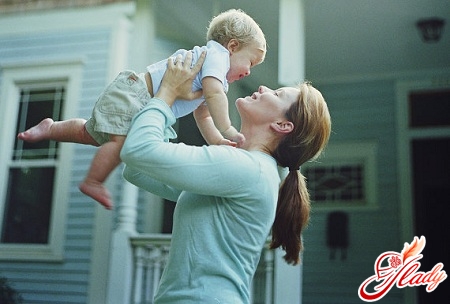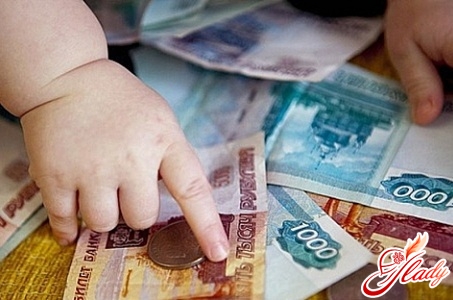 Families, in which the kids grow up, it's wonderfulare aware of how much strength, patience and resources are needed to put at least one child on their feet. It is very good if both parents are equally involved in this laborious process: the pope earns money, the mother is engaged in the child and the house. As the baby grows up, responsibilities in the family are either redistributed or not, depending on the realities and desires of family members. The whole point is that two people, father and mother, share a difficult burden of raising children. It is such a family that is considered traditional in the conventional sense. However, in our difficult times, when changes and new trends have touched all spheres of life, and even the seemingly unshakable boundaries between the male and female beginnings have become transparent, the frequent choice among the representatives of the beautiful half of humanity is the conscious choice to give birth to a child. This happens even in the case when a joint life with his potential father is either impossible for a number of reasons or is generally undesirable. Such a position in our country was considered a few decades ago if not nonsense, then at least it was quite rare. Indeed, the fact of the birth of a child without a husband was perceived in society as a disgrace for a woman. Therefore, rarely anyone deliberately decided on such a step. In general, single mothers at that time considered the birth of their child as a mistake of youth. It was not their conscious decision to conceive, but rather an accident, and the birth of the baby was dictated by circumstances, and not by a deliberate desire. But recently the situation has changed: relations between men and women have become more complicated, the institution of family and marriage has lost its former weight, but the instinct of motherhood still lives in each of us. Therefore, the question of what kind of rights the state provides for modern single mothers, how well their status is protected by legislation and what benefits are provided, are especially relevant.
Families, in which the kids grow up, it's wonderfulare aware of how much strength, patience and resources are needed to put at least one child on their feet. It is very good if both parents are equally involved in this laborious process: the pope earns money, the mother is engaged in the child and the house. As the baby grows up, responsibilities in the family are either redistributed or not, depending on the realities and desires of family members. The whole point is that two people, father and mother, share a difficult burden of raising children. It is such a family that is considered traditional in the conventional sense. However, in our difficult times, when changes and new trends have touched all spheres of life, and even the seemingly unshakable boundaries between the male and female beginnings have become transparent, the frequent choice among the representatives of the beautiful half of humanity is the conscious choice to give birth to a child. This happens even in the case when a joint life with his potential father is either impossible for a number of reasons or is generally undesirable. Such a position in our country was considered a few decades ago if not nonsense, then at least it was quite rare. Indeed, the fact of the birth of a child without a husband was perceived in society as a disgrace for a woman. Therefore, rarely anyone deliberately decided on such a step. In general, single mothers at that time considered the birth of their child as a mistake of youth. It was not their conscious decision to conceive, but rather an accident, and the birth of the baby was dictated by circumstances, and not by a deliberate desire. But recently the situation has changed: relations between men and women have become more complicated, the institution of family and marriage has lost its former weight, but the instinct of motherhood still lives in each of us. Therefore, the question of what kind of rights the state provides for modern single mothers, how well their status is protected by legislation and what benefits are provided, are especially relevant.
Legal interpretation of the status of a single mother
For a simple philistine, not very goodsavvy in all the existing legal subtleties today, every mother who brings up one or more children without a husband is lonely. However, in fact, from the legal point of view, a woman has a similar status only if:
- a child is born out of formal marriage;
- the birth of the child occurred more than 300 days after the divorce;
- the child was born into a legal marriage (or before the expiry of 300 days after the divorce), but the husband disputed the fact of his paternity in court;
- the child was adopted outside of the marriage.
In other words, the status of a single motherprovides the following wording: a woman with a child (children) whose father (s) are officially absent. Accordingly, a woman can not be considered as such under the law, if she:
- Raises a child (children) after the dissolution of a legal marriage, even if the former spouse does not pay maintenance;
- gave birth to a child in the period up to 300 days from the date of divorce (or recognition of the marriage as invalid), and within 300 days from the date of death of the husband;
- gave birth to a child out of legal marriage, but the fact of paternity is established in the courts or voluntarily, even if the man lives separately;
- is a widow;
- educates a child (children) whose father (s) are deprived of parental rights.
In all the cases listed above, the children still have or had an official father, so their mothers are women with a child (children), but without a husband. 
Why does the paternity graph often contain a dash
Very often, when a single mother goes to the organsZAGS registration of their newborn baby, his employees advise to put a dash instead of data on the actual father. Naturally, they give such recommendations, pursuing their own interests, but still their words should be taken into account. This is due to a number of bureaucratic factors, for example:
- in case of traveling abroad with a childthe permission of the father is required, and in fact often its location is unknown - as a result of the mother it will be necessary to try to prove the fact of its legal absence;
- if necessary, to register a child, workers in the housing sector may insist on the presence of the father, although this is not entirely legal, but very relevant for the capital region;
- In the case of a dangerous operation involving a high risk for the life of the child, doctors sometimes require you to sign a permit from both parents - this is certainly an exception, but life is unpredictable.
That's what causes single mothersput a dash in the paternity information column. But it must be said about the minus of such a decision with respect to the right of inheritance. After all, according to the law, children who do not have in the birth certificate official records of the actual father, are deprived of the opportunity to inherit his property. Therefore, the mother must weigh the pros and cons in both cases and rely only on her own choice to protect her rights and the child.
Benefits relying on a single mother
A woman in the status of a single mother has all the rights to receive the same benefits associated with the birth of a child, which are provided for the remaining categories.
- a one-time allowance payable in case of registration in a women's consultation at the time of pregnancy, not exceeding 12 weeks;
- maternity benefit (maternity leave);
- a one-time childbirth allowance;
- monthly payments for the period of leave to care for a child who has not reached the age of eighteen months.
These are the so-called mandatory federalbenefits. But in each subject of the Russian Federation there are some additional subsidized funds that are assigned at the time of the birth of the child. And it is necessary to take into account that some of them concern everyone, while others are directed specifically at supporting a single mother, for example:
- monthly allowance for families with children under the age of majority if their total income is outside the subsistence minimum;
- compensatory monthly payments due toincreases in food prices for children up to 3 years of age and caused by an increase in the cost of living for children under 16 years of age;
- monthly benefits for single mothers or fathers who have a disabled child under the age of 18 (disabled from childhood to age 23);
- payments provided monthly for a child living with a single mother or father who have a disability of the first and second groups and who do not work.

The rights of a single mother in the labor, housing and tax codes
The state regulates the rights for singlemums for receiving a number of benefits in the tax, labor, housing and social spheres. Thus, the working mother, according to the current tax code of the Russian Federation, has a double standard tax deduction ("child") for expenses for the maintenance of the child before reaching the age of 18. But the woman loses this right as soon as she enters into legal marriage. The Labor Code indicates that a single mother has a number of advantages at work. For example, she can not be dismissed at the insistence of the administration if her child has not reached the age of 14, with the exception of the liquidation of the firm, but subject to compulsory employment. The employer is obliged to provide the workplace to such a woman and in the case when the term of the employment contract (contract) expires, with the preservation of wages for three months from the end of the contract. A single mother is entitled to pay for a sick leave due to illness of a child under 14 years old at the rate of 100% and for a period longer than other women. They are also entitled to an additional 14 days of leave without pay at any convenient time. Single mothers raising a disabled child have the right to provide them with 4 additional days off per month at work. The Housing Code, in turn, determines the priority for such women in obtaining free housing. But even here there are limitations that are common to everyone, regardless of status: only those categories of the population who are legally entitled to improve their housing conditions can claim state-run square meters. A single mother also has rights to a number of social benefits. Juvenile children of such women can be accepted into a children's institution to fully provide the state, schoolchildren are entitled to free textbooks and food. Also, once every two years, it is possible to allocate vouchers to sanatoriums and children's camps without having to pay their full cost. For some drugs, especially expensive, single mothers are provided with a discount of up to 50%. Mothers who raise children without the participation of their father need help at all times. It can be financial or in the form of benefits from the state, but often modern working women are fully capable of providing both themselves and the child. However, no less important is the help of society, or rather, the correct attitude of people towards single mothers. And it consists in tolerance and understanding, because a woman, independently raising a child, has all the rights both for personal life, and for professional growth and career development. Therefore, do not condemn a single mother who is trying to find happiness in marriage. This is not an attempt on her part to infringe on the interests of the child, but the desire to educate him in a full family. If such a mother is among your colleagues at work or is working under your supervision, try to understand with understanding that she sometimes has to leave for school or other affairs related to the child. Take into account the fact that, in addition to her, there is no one else to look after your son or daughter during illness. It is important that both the state and society learn to respect the rights of such special mothers and do not perceive them as uncomfortable, eternally disaffected beneficiaries, because they alone cope with the difficult task of raising children. We advise you to read:









